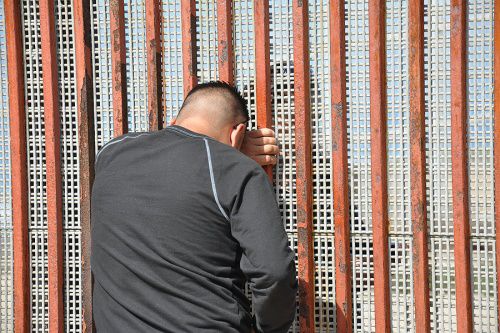“Please help us, please pray for us.” These were the words of detained migrants and refugees at a Karnes, Texas facility who spoke Archbishop Gustavo Garcia-Siller of San Antonio and his visiting delegation of religious leaders last year. “As the archbishop said Mass under a tent in the compound, the fear and trepidation on the faces of the mothers were clear,” said a new report’s account of the 2014 visit. “One by one, they prayed aloud for deliverance from the facility and for reunification with their families.” “Many had been traumatized from their journey north from Central America. One confessed that her husband had been murdered by gang members and that they had threatened her and her children as well.” Many detainees had no lawyers to assist with their asylum claims and received little information from enforcement officers, the report said. Although the facilities were “clean and spacious,” the visitors left “deflated and frustrated, awake to the damage caused by the facility, despite its outward appearance.” These detainees, and hundreds of thousands more, are the focus of a new joint report, “Unlocking Human Dignity: A Plan to Transform the U.S. Immigrant Detention System,” authored by the U.S. bishops and the Center for Migration Studies of New York. Seattle auxiliary Bishop Eusebio Elizondo, chair of the U.S. bishops’ migration committee, and Nicholas DiMarzio of Brooklyn, who chairs the Center for Migration Studies, wrote a letter introducing the 44-page report, which examines flaws and abuses in the immigrant detention system, its impact on “the human rights and dignity of our fellow human beings,” and recommendations for systemic reform. “We experience the pain of severed families that struggle to maintain a semblance of normal family life. We see traumatized children in our schools and churches. We see divided families that are struggling to support themselves in our parishes, food pantries, soup kitchens and charitable agencies,” wrote the two bishops, who visited detention centers in Texas, California, Illinois, Arizona, and New Jersey. “We see case after case of persons who represent no threat or danger, but who are nonetheless treated as criminals.” The report noted a significant increase in the number of detainees. Between 1994 and 2013 the number of immigrants detained daily rose from 6,785 to 34,260. Annual detention figures increased from about 85,000 people in 1995 to 440,557 in 2013. Under President Obama, detention numbers have reached record levels. The Department of Homeland Security, which lacks the authority to imprison criminals, holds hundreds of thousands of non-citizens, and sometimes U.S. citizens, in prisons, jails and other facilities. Detainees are “governed by standards designed for criminal defendants,” the report said. “Detention brands immigrants as criminals in the public’s eye and contributes to the sense that they deserve to be treated as such,” it continued. The report charged that detainees receive harsher treatment than criminal defendants, most of whom receive rapid custody hearings and can be released on conditions that ensure their court appearance and the protection of the public. Detainees, in contrast, face increased difficulty securing legal counsel and due legal process. “It is time for our nation to reform this inhumane system, which unnecessarily detains persons, especially vulnerable populations, who are no threat to us and who should be afforded due process and legal protections,” Bishop Elizondo said in a May 11 statement from the U.S. bishops. “The current legal and physical detention infrastructure should be largely dismantled,” the report said, recommending “non-penal settings” for detainees that ensure minimum standards like “generous access to religious services.” The report called for a substantial reduction in the number of immigrant detention facilities and in the role of for-profit prisons. It said detention should not be used to deter illegal immigrants or refugees. Rather, detention should be used “only as a last resort.” Bishop Elizondo said U.S. policy follows a presumption “to detain immigrants as a management, enforcement and deterrence tool” rather than “to make individual custody determinations based on family and community ties.” “This has resulted in the long-term detention of asylum-seekers, victims of human trafficking, survivors of torture, and, now, young mothers with children.” The report explained that Catholic ethics recognize sovereign states’ ability and responsibility to regulate migration. However, it characterized the detention of migrants and refugees as “neither humane nor, in its current form, necessary.” Some detainees have been severely mistreated, it added. “Attorneys and pastoral workers from Catholic agencies have learned first-hand of the sexual abuse of women detainees, women forced to deliver babies in restraints, frequent hunger strikes, suicides, government officials pressuring detainees to abandon their legal claims, and the treatment of severe medical conditions with Tylenol, Advil, and Motrin.” Bishop Nicholas DiMarzio of Brooklyn encouraged policymakers to adopt alternatives to detention. “There are ways to create a humane system and also ensure that immigrants are complying with the law,” he said. “But we have created a detention industry in this country which preys upon the vulnerability of our fellow human beings, the vast majority of whom are not criminals.” U.S. Immigration and Customs Enforcement itself classifies only 20 percent of detainees as requiring a “high custody level.” As an alternative, the Brooklyn bishop recommended community-based case management as a cost-effective and successful model in the legal processing of immigrants. Illegal entry to the U.S. is a crime, but it has historically been treated as a violation of civil law rather than criminal law. The U.S. bishops have “strongly opposed” the criminalization of U.S. immigration law, the report said. Mandatory detention laws have guaranteed “the excessive use of detention” and have precluded the release of those with minimal flight risk. “Detention wastes not only government funds, but the human potential of hundreds of thousands of persons each year,” said Donald Kerwin, the executive director of the Center for Migration Studies of New York. The report stressed that detention reform does not require waiting for the passage of comprehensive immigration reform. Recommended reforms included a call for a congressional study on the creation of “a truly civil immigrant detention system.” The Department of Homeland Security should create a “full menu” of alternatives to detention, with “varying degrees of support and supervision, reporting, oversight and monitoring.” The report recommended more funding for the U.S. immigration system to diminish a case backlog whose average wait time is now more than 18 months. Government-supplied legal representation for detainees would “substantially” increase court appearance rates while potentially reducing overall costs due to less use of detention, more efficient court proceedings, and less frequent placement of detainees’ children in foster care, it said.

